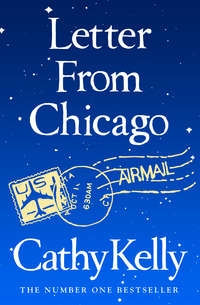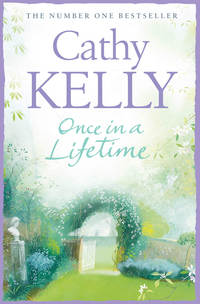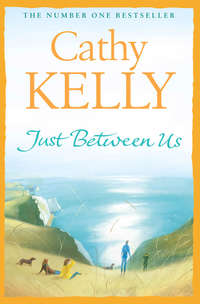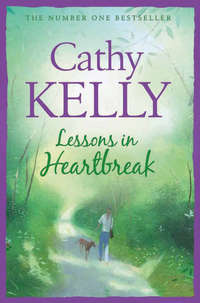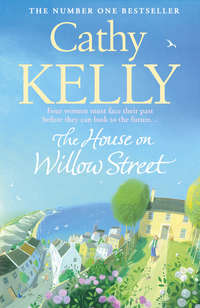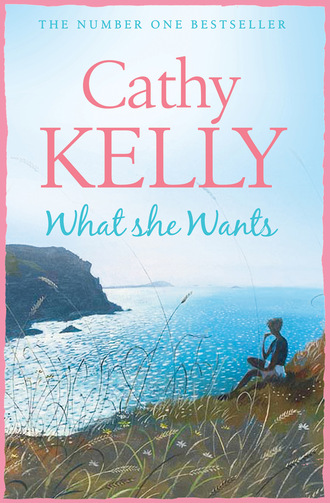
Полная версия
What She Wants
When she’d moved into the house four months ago, she’d smiled apologetically in return, saying ‘sorry, no, it’s not a B & B any more.’
Now, she felt like throwing burning tar out the top windows and yelling ‘leave me alone!’ every time a fresh influx of visitors arrived with their five-year-old B & B guidebooks and hopeful expressions on their faces. It was beyond her why the owners had sold up in the first place. Judging from the amount of walk-in custom they were getting, even in October, they could have run a hundred-bed hotel and still be busy.
She put the driver carefully back in the golf bag and walked round to the front door where a gleaming people carrier was parked. Four people were standing on the gravel.
One man was stretching aching limbs and another was hauling bulging suitcases from the vehicle. A small, dark-skinned woman was peering at a guide book, reading out bits in heavily-accented English, while a taller woman looked over her shoulder.
‘Can I help you?’ inquired Virginia.
‘Excuse me for not phoning,’ said the woman with the guide book. Italians, Virginia thought, judging by that lyrical accent with its exotic rolling consonants. ‘We hope you have rooms we can rent tonight.’
‘I’m afraid this isn’t a bed and breakfast any more,’ Virginia said apologetically polite in spite of herself.
The foursome looked crestfallen.
‘We have been driving for so long,’ said one of the men tiredly.
‘There is another place you can stay in the village,’ Virginia offered and went on to tell them about Mrs Egan’s De Luxe B & B down the road, just the other side of Red-lion. No, it wasn’t in the guide books but if they needed somewhere in the locality, Mrs Egan would definitely have rooms.
She felt sorry to be turning them away; they looked exhausted and she was no longer sure if it was fair to direct people to Mrs Egan’s premises. She’d met Mrs Egan in the butcher’s and hadn’t liked either the way she ordered the cheapest rashers for her breakfasts, or the way she snapped at the butcher himself, a friendly giant of a man who didn’t deserve to be given out to because he’d forgotten to put aside a leg of lamb for her.
From what the constant stream of visitors said to her about Kilnagoshell, Virginia felt it had been a welcoming place where nothing was too much trouble and where the owners wouldn’t have dreamed of giving guests fatty, cheap rashers for their breakfast.
The foursome wearily packed up their belongings and waved at her as she watched them drive away. Virginia waved back, thinking that she mustn’t look quite as decrepit as she felt if these people wanted to stay with her. In her mind, she was still light years away from the tall, handsome Virginia Connell who’d always been perfectly dressed, not a silvery grey hair out of place as she helped out in the local Oxfam shop. That Virginia was the old one. The replacement was darker, sadder, with hollows under her hazel eyes and pain etched on every inch of her fine-boned face. She didn’t bother any more setting her thick hair in the gentle waves that managed to look so elegant: she tied it back in a taut knot. But that would have to change. She’d lived as a recluse for long enough and if she was to put a tentative foot back into the real world, she needed to look normal instead of like some loopy old dear with Miss Havisham tendencies.
She closed the garage and went inside to the kitchen to pull on her walking shoes and old waxed jacket. The waxy smell always reminded her of Oscar. He’d been such a darling little dog, a soft fawn coloured spaniel with velvety ears and a melancholy expression that made him look like a dog from a chocolate box. Every weekday of his life at half eight in the morning, Virginia had taken Oscar for his walk and when the weather was wet, she’d worn this very waxed jacket. Oscar had only to see it to go berserk, circling her feet with delight, barking and bouncing deliriously. The jacket still smelled of him. Virginia still tortured herself with the thought that if only she’d kept walking him after Bill’s death, Oscar might have still been alive.
It was her fault, all her fault. With enough exercise, Oscar wouldn’t have been so keen to escape the garden and run out onto the main road. She was glad that her local vet had offered to bury his silky little body in their plot in the mountains, otherwise he’d have been buried in the garden in Pier Avenue and she hated to think of the new owners digging him up in some garden revamp and dumping him.
‘Get another dog, Mum,’ Laurence had advised. ‘You and Dad always had dogs, you need one. It’ll be company for you; go on, you really should.’
But Virginia wouldn’t dream of it. A dog was something to care for and she was far too afraid of losing anything else to commit to any new responsibilities. As it was, she was possessed of a great fear that something would take the boys, Sally or baby Alison away from her. A fat tear fell onto the jacket’s worn corduroy collar. Virginia wiped her eyes fiercely. She wouldn’t cry, she wouldn’t. She’d go for her walk and try and forget Oscar.
She walked briskly down the avenue, past the beech trees with their glorious russet leaves. The last glow of autumn was still everywhere; trees and bushes holding onto their golden leaves, the single copper beech still a fiery bronze in the middle of the silver birches. In another month, the landscape would have changed totally, Virginia knew, with banks of leaves underfoot and every tree stark and bare against the hills. But for now, it was magnificent. She crunched through a stretch of road strewn with chestnuts. The boys had loved chestnuts, she thought fondly, picking one up and rubbing it until it gleamed like mahogany.
Onto the main road, she marched firmly towards Redlion. Her house was a mile from the village and she’d decided that she should walk there and back every day, if only to buy a newspaper. It was all too easy to bury yourself and see nobody.
She liked Redlion: it was quaint and somehow untouched. The winding main street, called, for convenience, Main Street, probably looked much the way it had fifty years ago, with small terraced houses on either side interrupted only by shops and pubs. There were three pubs, rather a lot for a small town, tourists were always saying in surprise. Virginia knew from experience that visitors were fascinated by the number of pubs in Irish towns. She remembered a friend of Bill’s from London being astonished by that. They’d taken him on a short trip down to Kilkenny and he’d kept remarking on the fact that they’d driven through several tiny hamlets that consisted of a scattering of houses, but which still managed to support two pubs.
‘How do they stay in business?’ he’d asked Bill in bewilderment.
Bill had laughed his warm, deep laugh and told his friend that he was in Ireland now and the usual rules didn’t apply. ‘There are different sorts of pubs for different people,’ Bill explained. ‘The old farmers might use one because it hadn’t changed since they were lads, and the younger people might go for another one with music and bar food. Real ould pubs only serve drink and cigarettes, you see. At the first sign of music, bar food or young women in short skirts, the ould fellas would take their custom elsewhere.’
Madigans in Redlion was a real ould pub in Bill’s definition of the word, Virginia thought. With its red and white lettering over the door and an elderly Guinness sign hanging outside, it looked like the pubs of her childhood.
On her walks, she’d often seen men in heavy boots, farm clothes and old caps ambling in for a quick lunchtime pick-me-up of porter. Her father, who’d been a farmer, had been fond of the odd lunchtime drink himself and she reckoned he’d have liked Madigans, which was the sort of place where you could happily go in with your trousers held up with baler twine and nobody would pay you the slightest bit of attention. The only part of the experience that required utter and complete attention was the pouring of the pint, which could take ten minutes of the barman’s loving art, meaning that wise drinkers ordered the next pint a good fifteen minutes before they’d need it, giving it that much needed time to settle.
The Widows, on the other hand, was a modern phenomenon complete with a bar food menu as exotic as you’d find anywhere. It had traditional music nights, quaint Oirish interior decor straight out of The Quiet Man, and a proprietor who understood that money in the pub business was trying to please all the people all the time. Virginia had been in there a couple of times and had marvelled at the modern take on an old-fashioned idea.
Virginia had never walked as far as the third pub, which was right at the other end of the village over the humpbacked bridge. That would be her mission today, Virginia resolved: to walk right through the village. It would make it a longer walk, certainly three miles all told.
She passed the painted sign that told her Redlion was twinned with a French town she’d never heard of. Redlion wasn’t at its best in the lashing rain but on a clear autumn day, the village was pretty and somehow timeless. Virginia walked past the chemist with its big side entrance for animal foodstuffs, past a row of whitewashed houses with a brightly painted blue one in the middle, and along past Lucille’s, a fashion emporium with a window display that changed weekly and was always wildly glamorous. This week, Lucille was showing off low-cut tops and mohair sweaters with an animal print theme. The centrepiece was a fake fur coat in dramatic leopard print with a matching Russian style hat. Virginia resolved to watch out for the ensemble at Mass. She wasn’t quite sure who actually bought any of Lucille’s extravagant outfits, but she knew she’d recognize anyone who did at fifty paces.
She walked on, keeping her eyes trained firmly on the distance in case she met anyone on her side of the street. People were very friendly, always smiling and saying hello, but she didn’t want to get dragged into friendships, and answering a simple ‘isn’t it a grand day?’ could be disastrous. Replying would mean a full-blown conversation and she didn’t want to talk to people, she wanted to be left alone.
It wasn’t hard today. The village was quiet. At this time of year, the tourists were few and far between. But Virginia knew that once Easter came, the place would be crammed with people stopping at the Widows for a plate of smoked salmon and a blast of traditional music. They clambered out of cars and buses in droves to admire the painted houses and the quaint arts and crafts shop which did a roaring trade in hand-knitted sweaters, bits of lace, plaques with Irish family names on them, and odd pottery bits and bobs made by the hippies who lived in a commune far up the mountains. The hippies were tolerated, Virginia knew thanks to overhearing a conversation in the post office, because they kept themselves to themselves.
But the hard-working local people with businesses were always nervous of a whole tribe of crusty travellers arriving and setting up messy shop in a field somewhere and ruining the successful business of tourism.
Virginia had seen one of the hippie women once: tired-looking with yellow dreadlocks, tattoos on her arms and a child glued to each hip. Close by, a business-suited young woman marched out of the estate agent’s and climbed into her Mercedes sports car, rushing and ignoring everything around her. Both would have looked out of place in the Kerry of Virginia’s youth.
Today, Virginia had the place pretty much to herself, apart from a couple of women standing outside the butcher’s with their striped plastic bags, having a chat now that they’d bought the dinner. As she walked, her hip twinged a bit. Why you got arthritis in one hip and not the other, Virginia didn’t know, but that was no excuse for not getting her daily walk. She walked firmly on. She was nearly half way there after all.
The phone was ringing furiously when she got back and she raced into the hall, still in her leaf-covered walking boots.
‘Mum,’ said the chirpy voice of her daughter-in-law Sally in London, ‘how are you?’
‘Fine, Sally,’ Virginia answered, pleased to hear from the only member of her family who didn’t say hello with the expectation that Virginia would burst immediately into depressed tears. ‘How are you lot? Is Alison still ruling the roost with Dominic wrapped round her little finger?’
Sally groaned. ‘Don’t ask. He ruins her. She’ll have a bike, a pony and a toy motorbike before she’s two if Dominic has anything to do with it.’
They chatted away for a few minutes, talking about how Jamie had been in London and had come round to dinner one night with his new girlfriend, ‘very pretty and clever. Dominic kept teasing that she was much too clever for him.’
Virginia smiled a little wistfully. That was what she missed: being a proper part of her sons’ lives, being there to meet new girlfriends and give her opinion on them. Laurence, who was a dentist, had told her about Barbara, the fabulous dental nurse he’d only just met and how Virginia would love her to bits, but the three of them hadn’t managed to meet up yet. Still, she mustn’t dwell on things. She’d chosen a new life because it was a break from the pain of the past. What was the point in whingeing about parts of the old life that she missed?
They talked about Alison’s sleeping pattern or rather, her non-sleeping pattern; how tired Sally was from looking after her and working from home; and how much she and Dominic were looking forward to their skiing holiday in Austria over Christmas.
‘Virginia,’ Sally said suddenly, sounding anxious. ‘We won’t go to Austria if you’d like us to come to you, you know that. I don’t want you to think that we wouldn’t want to come to you. We’ll cancel Austria and hop on the ferry…’
‘Don’t be ridiculous,’ Virginia interrupted. ‘I wouldn’t dream of it. You need a proper holiday as a family, not one where you’re forced to visit me. I’ve told you I’m spending Christmas here this year and you’re all to stop feeling guilty about it.’
Virginia thought of a fridge magnet she’d seen: ‘my mother is a travel agent for guilt trips.’ She’d laughed heartily at the idea because it had been a fair description of her own mother.
Therefore, Virginia had been determined never to lay guilt trips on her three boys. Even in the darkest days after Bill’s death, she’d refused to let herself beg for their help. Laurence had stayed with her for a week but then she’d sent him back to his apartment in Swords.
‘I’m the mother and you’re the child,’ she’d told him firmly. ‘It’s not your job to mind me. I’ve got to get on with it myself.’
By the same token, Dominic and Sally deserved to spend Christmas any way they liked without worrying about her. Besides, she felt even more wretched than ever when the kids were tiptoeing around her. The joy of having them to stay was overwhelmed with the sense that Bill should be there too, which was just too painful.
At least when she was on her own she could deal with her grief on the bad days. If that meant spending the entire day crying with her face as red and raw as beetroot, then she was free to do just that. When there were other people around, pride made her stifle the tears.
Virginia changed the subject. ‘I’ve just come back from a long walk and I’m looking forward to having a hot bath and curling up with my new book.’ This wasn’t entirely true. Virginia hoped that a hot bath would ease her aches but she couldn’t cope with reading any more. Her favourite novels just made her cry at their memories of happier times. She managed the newspaper and that was it. Even the crossword reminded her of Bill asking for help with eight across.
‘It’s great that you’re walking again,’ said Sally. ‘Is your hip bothering you much?’
‘Not at all,’ lied Virginia. ‘There are some very pretty walks around here. The village is lovely. You’ll have to come and stay. In the summer,’ she added rapidly, in case she sounded all needy again.
‘We can come…’ Sally began.
‘Sally love, I need this time alone,’ Virginia interrupted. ‘I really do. Please make Dominic see that, you know I can’t tell him myself.’
‘I know. He only wants to help,’ Sally said quietly. ‘We all do.’
Virginia shrugged. ‘Nobody can help me but myself.’
CHAPTER FIVE
Nicole Turner looked as if she was working – for once. Her dark head was bent over her desk and there was no tell-tale grin on her impish face which would have been a sure sign that she was telling jokes with her next-door neighbour, the equally feckless Sharon Wilson.
From her position at the top of the room, Ms Sinclair, claims department supervisor, narrowed her eyes as she looked at the bane of her life. Nicole Turner could look demure and hardworking even when she was secretly planning some prank that would cause uproar in the busiest department of the London headquarters of Copperplate Insurance. Like that time she’d rigged the big clock behind Ms Sinclair’s desk so it was half an hour early, meaning that everyone left for lunch at half twelve instead of one.
Naturally, Nicole had switched the clock back during lunchtime, so that when everyone arrived back at two, they’d actually had an hour and a half for lunch. In Ms Sinclair’s eyes, this was a sacking offence but she had no proof that Nicole was responsible so nothing could be done. And the section head pointed out that Nicole’s work was always excellent, so there were no grounds for firing her.
You had to watch her all the time, Ms Sinclair decided darkly. It was a task she relished.
At her desk at the back of the room, Sharon Wilson’s phone rang and she picked it up.
‘Hello, claims department,’ she trilled.
‘Is that old bitch still watching me like a hawk?’ asked Nicole, who was less than three feet away but who knew that clerical staff talking without actually being attached to their phones were in for a big black mark from Ms Sinclair.
Sharon peeked up the room. ‘Yes. Actually, she’s really staring at you now.’
‘Shit.’
Out of the corner of her eye, Sharon could see Nicole stand up and search through some files on her desk, her brow furrowed as if she’d been asked a sticky question by a customer and needed to check it out. Nicole located the big Copperplate Insurance manual and sighed theatrically as though her greatest wish in the entire world had been granted because she’d found the manual. She flicked through the pages and stopped in the middle.
‘Ms Wilson,’ she said now in her best placate-the-customer voice, ‘I’m afraid we won’t be able to cover your claim for the deer running out onto the road and flattening your Mini Cooper…’
Sharon giggled and had to hide behind her computer so nobody could see her.
‘You see, Ms Wilson, we happen to know that you were down the Three Crowns public house on the night in question and had seventeen pints of best bitter, before you climbed into the driver’s seat and drove home, with your boyfriend in the seat behind you attempting to remove your brassiere; a feat not recommended in the Rules of the Road handbook. Therefore, we feel unable to cough up the twenty-seven thousand pounds you feel entitled to. We will be, however, paying for plastic surgery for the deer, alright?’
Sharon giggled some more.
‘Seriously.’ Nicole had switched into her normal voice although to any onlooker, her expression was as grave as if she was on company business. ‘I’ve just got an e-mail from my pal Bacardi King. One of his friends is getting married and the stag party’s in the Red Parrot tonight and if you’re interested, we can go.’
‘To a stag party on a Thursday?’ said Sharon dubiously.
Nicole allowed herself to smile. ‘Ms Sin-Free-Zone-Clair isn’t in tomorrow so we can be as hungover as skunks and nobody will mind. And all Bacardi’s female friends are going. Having men only at stags is very old fashioned.’
‘OK,’ said Sharon, who adored Nicole and who felt that in the three years she’d worked with her, her own social life had improved no end. Nicole hung up and returned to her e-mail.
‘Hi B-King, love to hit Red Parrot with u. Is dressing up part of plan? Haven’t dressed up since I went to hallowe’en night party as a mummy – all rolled up in loo roll taken from the last pub. The bouncers in the night-club didn’t see the funny side of it, for some reason. Said I could be charged with robbing loo paper! No sense of humour. See u at 8.
Nicole.
Thursdays were perfect for going out. Her gran came over on a Thursday, so Nicole didn’t have to worry about who was going to be babysitting five-year-old Pammy.
At six o’clock on the nail, Nicole got up from her desk, dragged her backpack from underneath it and stalked off to the loos on her gravity-defying knee-high boots, regardless of the fierce glares from Ms Sinclair.
Sharon watched her friend enviously. Nicole just didn’t care about what people thought. Nicole never got embarrassed when she went to buy her round and found she didn’t have enough cash, and she’d just laughed the day they’d been running for the bus and she fell into a puddle of water, with at least thirty people watching. Sharon would have been puce with embarrassment. Nicole groaned good humouredly because the entire front of her skintight jeans were damp.
‘I’ll look like I wet myself,’ she said, ‘and we haven’t even had a drink yet!’
At five past six, having delayed for a few minutes because that way, it looked as if she was so engrossed in her work that she hadn’t noticed the time, Sharon gave her desk a cursory bit of tidying and rushed to the loos. Nicole was there, having a forbidden cigarette before she put on the minuscule amount of make-up she wore.
That was another reason to be jealous of her best friend, Sharon thought with a resigned sigh as she compared their reflections in the mirror. Nicole was so beautiful. Her café au lait skin glowed no matter how exhausted she was, and the tigerish amber eyes with their feline tilt at the outer edges dominated her triangular little face. Her concession to make-up was lots of glossy lipstick because her mouth, inherited from her mother instead of from her Indian father, was on the small side.
Her hair was her one vanity: she spent a fortune on conditioning treatments and shine products and it hung in a long, glossy curtain down her back. Even her body obeyed her. Tall, and slender as a reed, she had fantastic legs that looked scarily long in the black PVC mini-skirt she’d just changed into.
But Nicole was just about the best friend in the entire universe, which meant you couldn’t be jealous of her.
‘Want a fag?’ Nicole asked now in her husky voice.
Sharon took one, lit it and went into a cubicle to pee. They weren’t supposed to smoke in the loos but if Nicole could do it, so could she.
‘Are you up for karaoke tonight?’ Nicole said, pulling off her cream work jumper and wriggling into a small pink T-shirt with glittery stars emblazoned all over the front.
From behind the toilet door, Sharon groaned. ‘You know I can’t sing and I’m not making a fool of myself in front of all those guys at the stag night.’
‘Oh come on,’ Nicole begged. She needed someone to get up and sing with her or she’d feel stupid doing it. She hated show offs. Nicole adored singing and had been exercising her raw husky voice in private since she’d been a child. She often wrote her own songs but it was only for fun. Singing publicly was another matter. There was nothing worse than people who thought they were Kiri Te Kanawa getting up at family parties and sounding like a collection of drunken crows. Nicole couldn’t bear that. But since, at the age of fifteen, she’d sneaked into the local pub for an illegal drink and discovered karaoke, she’d loved it. While the other people she partied with thought that the sing-a-long part of an evening was just drunken fun, for Nicole, it was the best bit. She adored singing to Tina Turner and Whitney Houston tracks and loved having her pals waving their beer bottles up at her happily as they hummed along and cheered. But you had to get someone to get up there with you in the first place, Nicole felt. Otherwise you looked like a stupid show off.


